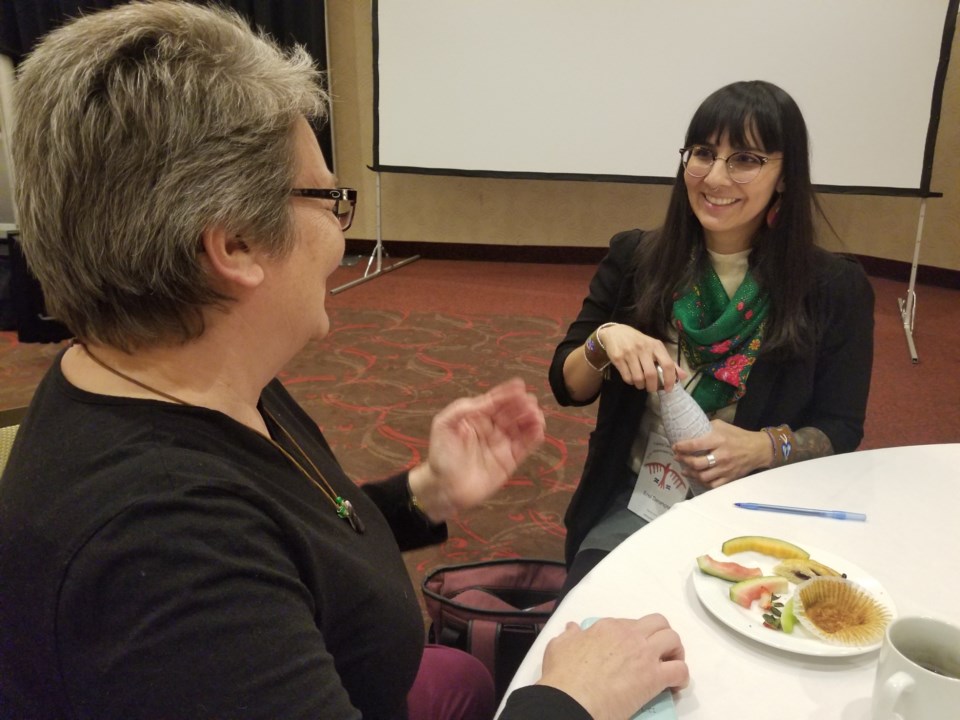Indigenous Climate Action Executive Director Eriel Deranger says it's time that Canada recognizes Indigenous peoples and land protectors as champions for climate change mitigation.
Deranger, originally from Athabasca Chipewyan First Nation in northern Alberta, has carved out a career as an activist who has worked with environmental groups and the United Nations on environmental justice and climate change issues.
She was in Sault Ste. Marie Wednesday, where she delivered a keynote address for the Algoma University Taking Care of Our Land Symposium.
“I think that sometimes we get stuck talking about climate change,” Deranger told SooToday. “We talk about Indigenous knowledge and Indigenous peoples as providing us with aspects of knowing how to adapt to the land, because we’re the first to see the changes, and we’re first to be impacted in that kind of narrative, and the reality is that Indigenous peoples aren’t just the first to be impacted, we are also the first to come up with solutions, and our solutions aren’t necessarily rooted in the same sort of economic structures, our technological structures, as most of society is looking towards.”
“Renewable energy, solar, technological fixes are important, and we should be absolutely exploring those things, but we also need to be exploring other solutions as well that are rooted in connection to land and place and territory, and that are centred around Indigenous values and knowledge.”
Deranger says that ecosystem safeguards, such as Indigenous conservation areas and protected areas, are examples of Indigenous stewardship that could potentially mitigate the impacts of climate change, while building up an ecosystem’s immunity through the process of capturing and storing atmospheric carbon dioxide - a process that’s also known as carbon sequestering.
“When we protect ecosystems and we preserve those ecosystems, they actually contribute to decreasing the creation of emissions, but they also increase the ability for ecosystem sequestration of carbon emissions,” she said.
Deranger told SooToday that Canada’s Boreal Forest is often undervalued, as it sequesters twice the carbon of a tropical forest, and also sequesters 22 per cent of global emissions - but enough isn’t being done to protect it and the communities that are situated within it.
She says that Canada is the fastest deforesting and land change nation, meaning that the country is engaging in the practice of taking forests and constantly changing them by deforesting for soft lumber, then replanting right away.
“Canada doesn’t often get looked at as a deforesting nation, because we’re only changing the landscape, not deforesting it - it’s like semantics, right?” said Deranger. “But the reality is that we are disrupting the ability for our forests to continue to sequester the carbon in the way that they have for millennia, and we’re also deforesting for mega-projects like liquid natural gas, tar sands operations, mega-hydro and other sort of oil and gas operations.”
“So when we think about the deforesting that we’re doing to pave the way for big emitters and big greenhouse gas emitters, you’d think we should be doing the opposite,” she continued.“So Canada’s moving in the wrong direction, and then we have Indigenous communities that are standing up and challenging pipeline projects, challenging major hydro projects, challenging tar sands projects, challenging LNG (liquified natural gas) projects.”
“Instead of being applauded for putting pressure on the government to make measures to mitigate climate change and protect ecosystems and the values and the rights of Indigenous communities, we’re criminalized. I think it’s time for us to recognize Indigenous peoples and land protectors as champions for climate mitigation, and for biological diversity protection.”
Deranger says it was her parents that informed her own activism.
Her parents’ trapline extended to the far eastern-most reaches of Treaty 8 territory, which stretches from northeastern British Columbia to northwestern Saskatchewan.
“My parents were actually forcibly removed from our traditional territory with armed guards of a uranium mining company the year I was born,” she said.
Deranger was working in the realm of specific land claims and treaty land entitlement for six-and-a-half years, while the Athabasca oil sands were becoming a contested issue in a number of surrounding First Nations, including her home, Athabasca Chipewyan First Nation.
“Through that process, I recognized that the story of my family was not unique, and that this constant relocation or dispossession of lands and territory for extractive industries that led to the degradation of ecosystems was common, and it existed everywhere,” Deranger said.
After leaving her job, Deranger move on to youth engagement projects, educating youth about Indigenous rights as it relates to tar sands and extraction projects.
Deranger believes that all people - Indigenous and non-Indigenous alike - are dependent upon a system that enables climate change.
“We’re all suffering - as these industries grow, inflation happens and then you have to get jobs that pay exorbitant amounts just to afford to live,” she said. “We’re creating these really terrible cycles of dependency on a system that is actually a huge part of the demise of the climate and a demise of the planet.”
“These workers shouldn’t be angry at the activists, they should be angry at the government for putting them in a situation where they are now beholden to maintaining the status quo of an industry that it killing the planet - literally - and how do we maintain moving forward the line on the truth and reconciliation process of recognizing Indigenous peoples as stewards of this planet?”
Algoma University hosts its Taking Care of Our Land Symposium once every two years, with the first one happening back in 2015.
This year’s event - which focuses on climate change - wraps up Thursday at the Delta Sault Ste. Marie Waterfront.
